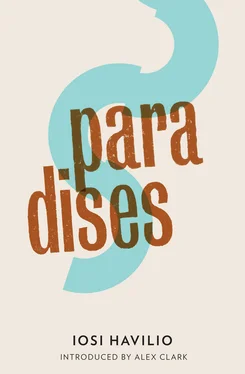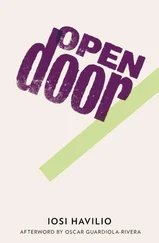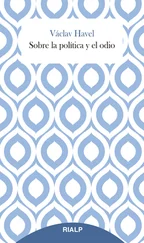Iosi Havilio - Paradises
Здесь есть возможность читать онлайн «Iosi Havilio - Paradises» весь текст электронной книги совершенно бесплатно (целиком полную версию без сокращений). В некоторых случаях можно слушать аудио, скачать через торрент в формате fb2 и присутствует краткое содержание. Год выпуска: 2013, Издательство: And Other Stories, Жанр: Современная проза, на английском языке. Описание произведения, (предисловие) а так же отзывы посетителей доступны на портале библиотеки ЛибКат.
- Название:Paradises
- Автор:
- Издательство:And Other Stories
- Жанр:
- Год:2013
- ISBN:нет данных
- Рейтинг книги:3 / 5. Голосов: 1
-
Избранное:Добавить в избранное
- Отзывы:
-
Ваша оценка:
- 60
- 1
- 2
- 3
- 4
- 5
Paradises: краткое содержание, описание и аннотация
Предлагаем к чтению аннотацию, описание, краткое содержание или предисловие (зависит от того, что написал сам автор книги «Paradises»). Если вы не нашли необходимую информацию о книге — напишите в комментариях, мы постараемся отыскать её.
is an almost perfect novel." — Albert Camus's
reimagined with a female lead in in twenty-first-century Buenos Aires.
Recently widowed, a young woman leaves the countryside for Buenos Aires with her four-year-old son where she seeks to build a new life for herself. She finds work in the zoo and moves into the human zoo of a squatted tower block at the invitation of one of its residents, to whom she acts as nurse, giving morphine injections.
Paradises — читать онлайн бесплатно полную книгу (весь текст) целиком
Ниже представлен текст книги, разбитый по страницам. Система сохранения места последней прочитанной страницы, позволяет с удобством читать онлайн бесплатно книгу «Paradises», без необходимости каждый раз заново искать на чём Вы остановились. Поставьте закладку, и сможете в любой момент перейти на страницу, на которой закончили чтение.
Интервал:
Закладка:
In human resources, there’s no sign of the man with spiky hair who interviewed me nor of the boy with freckles. I’m received by a mature woman of about fifty, very polite, who, although she takes a few minutes to work out who I am, becomes enthusiastic as soon as she does, as if she had a real interest in my debut. Take a seat, she says twice, and I decline both times. I have to find you on here, she explains, and draws her face right up to the computer screen, moving the mouse painstakingly, by the millimetre, as if it were a scalpel. There you are, I’ll print it out and that’s it. First she has to fight with the printer, which swallows the pages, crushing them as if rebelling against having to carry out the same task continually. She finally succeeds and hands me the three pages of the contract, which I glance over briefly; I know I’m going to sign it anyway. In a while, after finding me a uniform in my size, she accompanies me to my work post. At the entrance to the reptile house, she introduces me to Yessica, my colleague. That’s what she calls her, your colleague, and adds: I’m leaving you in good hands.
For what’s left of the day, Yessica will make no effort to ease things or help me integrate. Quite the reverse, she’s going to devote herself to making me feel like a nuisance at every opportunity. She has no intention of teaching me anything, she just points out what I’m doing wrong, what I’m not doing, complaining, smacking her lips in a most unpleasant way, like an alien. As if to say: It’s useless, not worth trying, poor little human. As soon as someone else appears, another colleague, one of the security guards, the girl from the bar, not only does she not bother to introduce me but she breaks off whatever she’s saying to me as if I didn’t exist and starts speaking to the person in front of her, throwing out comments that are unsubtly directed at me: What a day or What have I done to deserve this.
Unwillingly, presumably because she doesn’t want any complaints later on and because it’s her job to introduce newcomers to the working environment, Yessica eventually gives me a tour of the reptile house. She lists the names of the animals with an exaggerated lack of enthusiasm as we are already passing them: The boas, the pythons, the caiman, the lizards and further over, the tortoises. But don’t ask me anything, she says as we turn back, I have no idea.
Then, instead of following her, I rebel and return to the start to recommence the visit at a more leisurely pace. I say: I’m going to keep familiarising myself with the terrain. She shrugs, head tilting and eyes bulging, indignant: Who do you think you are, it would seem she’s going to say to me, but no, she keeps quiet. Some animals, because of their name, size or position, intrigue me more than others, they force me to stop walking and approach the glass that separates us. Above each species there’s a lit panel with information detailing dietary habits, behaviour, method of reproduction and habitat zones coloured in on a world map. There are hidden snakes that don’t show their faces, camouflaged behind the artificial trunks that make up their micro-world, others aren’t visible at all, very few of them moving, only one is looking out, the royal python. I read the sheet with the intention of memorising it: nocturnal habits, mostly land-based, areas of undergrowth, tall forest grasses, excellent swimmers. They hunt by lying in wait on the ground or in trees. Oviparous and carnivorous. They feed on small mammals, especially rodents. Also known as the ball python, their colouration varies from browns to ochres and golds. Average lifespan: twenty to twenty-five years. Location: west coast of Africa, from Angola to Senegal, also Zaire, Uganda and Sudan.
I also study the boa constrictor and the rainbow boa, neither of which is venomous; like the royal python they kill their prey by coiling round it until it suffocates. The rainbow boa is found in arid zones. Pastures in Central and South America. The constrictor has a very wide-ranging habitat, from high summits to sea level. It can be found not far from here, in Córdoba, Mendoza and San Luis.
Further along are the green iguana, the broad-snouted caiman and the American alligator. I leave them for another day. Something about the gloomy light, the smell of enclosure, the watchfulness of the snakes in captivity, produces a hole in my stomach, an anguish that forces me to increase my pace. I skirt the large tank of water turtles, ignore the lizards, walk past a door saying nursery and go outside.
A corridor of reeds, and I come out behind the polar bear’s pool. The keeper, I assume he’s their keeper, throws me a friendly smile: Are you lost or trying to escape? I like him. He’s a good-looking boy, with a man’s face, very hairy. On his arms and chest, as well as his hands, forehead and cheeks. He shows me the way back but he’s clearly keen because he stops what he’s doing, resting a long stick with a kind of rubber handle at the end against the railing, and approaches, coming to stand next to me: I’ll go with you. When did you start? he asks, and my response: Today, an hour ago. He laughs and I join in. I point at the reptile house like a little girl who’s relieved to recognise her own house after an excursion that took her too far. I raise my hand to thank him, but he insists on accompanying me. Seeing us arrive, Yessica gets down from her stool and opens her eyes wide. The boy says: We got lost. Yessica lets out a harsh laugh, exaggerated and porcine, and I begin to feel the irritation growing inside me.
The rest of the afternoon goes by with no major incidents. I pick up in passing from conversations between Yessica and another employee who stops off on his way to the office that the school holidays begin on Friday, and from Saturday on, this place will be mental with little brats. That’s what I hear: mental with little brats.
We get a twenty-minute break every shift to go to the toilet, smoke, do whatever you want, Yessica explains to me without taking her eyes off her mobile phone — she’s reading a message, searching for a number, playing solitaire, I don’t know. She raises her head and says: I’ll go first and when I come back you can go for a bit, ok? Yes, I say with a smile that doesn’t quite manage to be ironic. For the first time that day I sit on her stool ready to check tickets. I don’t see much action, only a pair of tiny pensioners. I pass the time watching what’s going on at the food stand opposite, painted with the colours and logo of Coca-Cola and surrounded by ducks. The girl working at the bar doesn’t have many clients either; she entertains herself moving a cloth over the counter, arranging the plastic cups, restocking the drink and popcorn machines. After a while she takes a break, leaning on her elbows next to the till, chin on her closed fist, and she looks in my direction. There we are, eyeing each other up until the sunlight forces us to squint. Not so much out of embarrassment but so as not to make her feel uncomfortable, I take advantage of a shout and avert my gaze: Look, Daddy, a peacock. Indeed it is, unfurling itself between the small canal and the red Coca-Cola chairs. A peacock.
Now you can go, Yessica tells me, and I obey even though I don’t really know where to go. I take ten steps and stop short. Disconcerted, I look in both directions and Yessica, who hasn’t stopped watching me, points out a circular construction surrounded by very tall pines before the feline cage. On the way, I come across a guy with a large broom who looks at me for so long that I end up greeting him. He introduces himself: Canetti, with a double t, head janitor. The dark shadows on his face make him look as though he has two black eyes. He’s lame and cross-eyed, obliquely: he drags his left leg and his right eye looks up to the corner. His lip trembles as if he’s received a low-intensity electric shock. He’s worked in the zoo for seven years. Seven years, he repeats, do you realise? I go into the toilet, I sit down to pee but don’t do anything, I splash my face with water and in the mirror I see myself dressed as an explorer for the first time. Another me. When I come out the guy is still there. He accompanies me to the reptile house, describing the terrain with a cigarette in his mouth. You’ll find everything here, he says and stresses, separating the syllables: Ev-ry-thing. He speaks well of some colleagues but slags most of them off. We say goodbye with a friendly handshake.
Читать дальшеИнтервал:
Закладка:
Похожие книги на «Paradises»
Представляем Вашему вниманию похожие книги на «Paradises» списком для выбора. Мы отобрали схожую по названию и смыслу литературу в надежде предоставить читателям больше вариантов отыскать новые, интересные, ещё непрочитанные произведения.
Обсуждение, отзывы о книге «Paradises» и просто собственные мнения читателей. Оставьте ваши комментарии, напишите, что Вы думаете о произведении, его смысле или главных героях. Укажите что конкретно понравилось, а что нет, и почему Вы так считаете.











